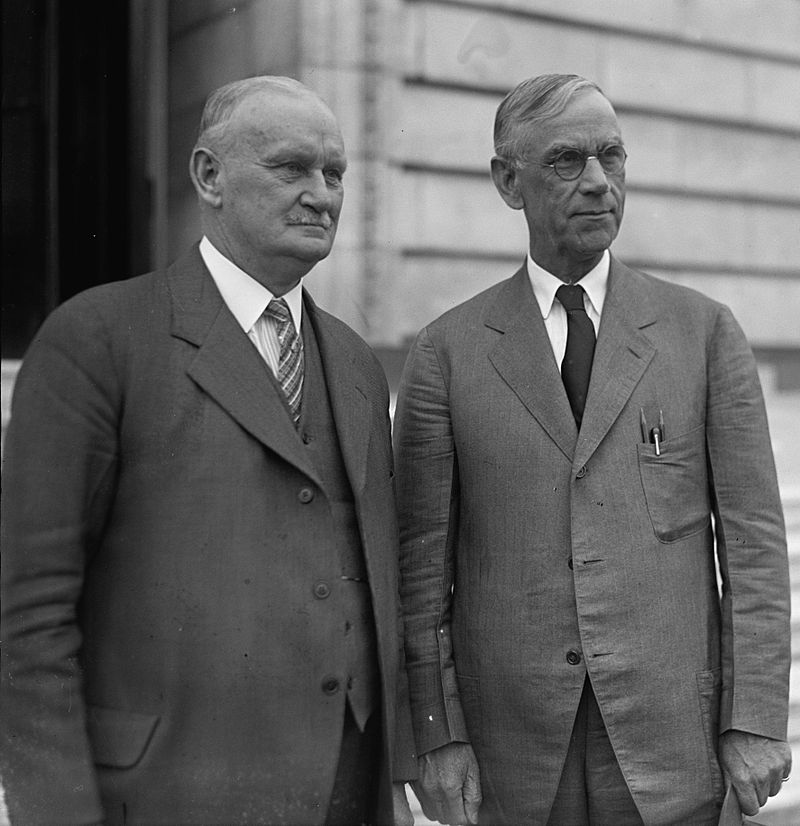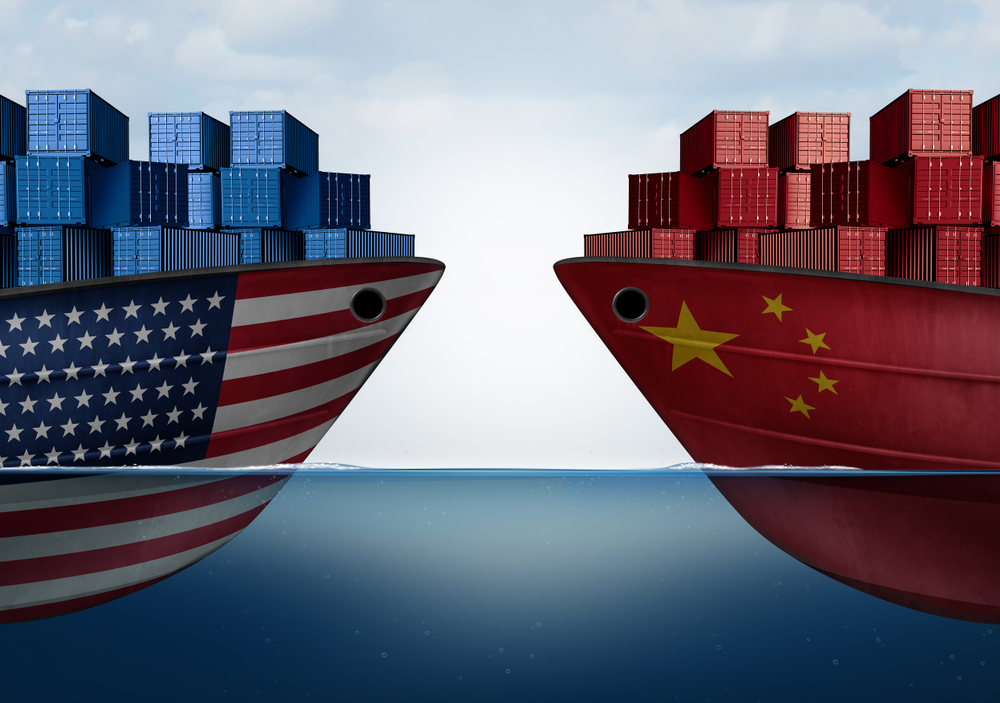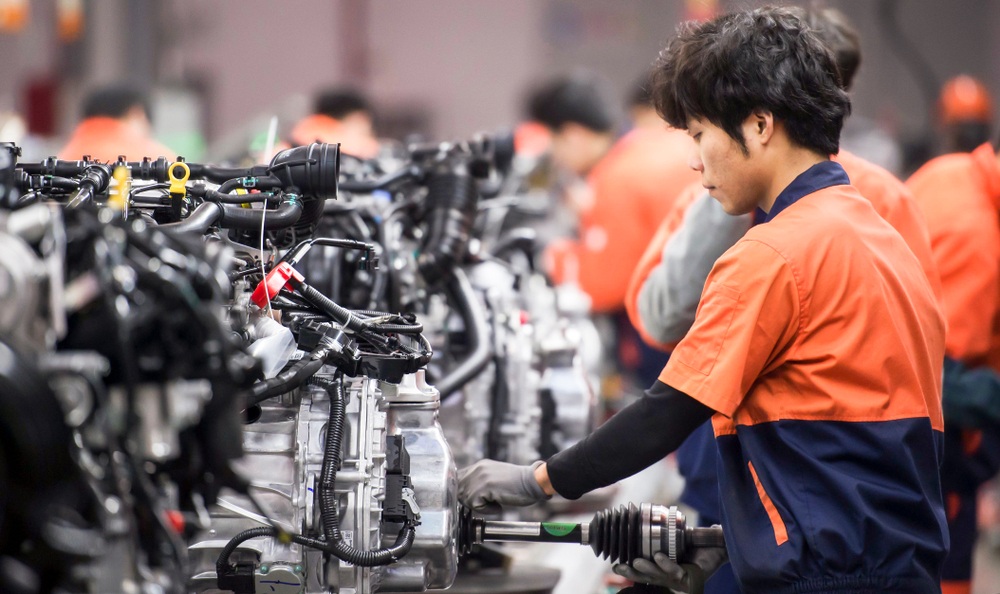Eric Lam reports for Bloomberg:
“The trade war between the U.S. and China and slowing retail sales dragged Hong Kong’s economic growth down at the end of last year, with exports showing almost ‘zero growth.’”
What’s astounding to me is that the people of the world accept that peaceful acts of commerce between consenting adults is any of the U.S. federal government’s business.
Tariffs Are A Form of Dictatorship


Willis C. Hawley (left) and Reed Smoot in April 1929, shortly before the Smoot–Hawley Tariff Act passed the House of Representatives. Source: The National Photo Company
There’s a man who lives in Hong Kong and one that lives in Texas who would like to trade resources in a mutually voluntary and reciprocal relationship for mutual benefit.
The man in Texas has too much of something and not enough of something else, and the man in Hong Kong has too much of something and not enough of something else.
So they make a trade, and even though there are the exact same amount of somethings in the world after they trade, those somethings found their way into hands that will make them more productive, so both men got richer and we all got richer.
But then suddenly a man appears out of a swamp in Virginia, stands between the two businessmen and says one of them owes him money if they continue to transact business.
To which the proper and reasonable response from the two businessmen should be:
“Excuse me, who the hell are you?
This is an A and B conversation, so why don’t you see your way out of it?”
“Who the hell am I?” the swamp marauder might answer.
“I’m the president of the United States. On Nov 8, 2016 I won the U.S. presidential election fair and square, now pony up- or trade with someone one on the right side of the line.”
So what? Winning a media circus-driven popularity contest does not give you the right to interfere in two other individual’s private business and shake them down for trading with each other instead of someone else. That is no way to treat anybody.
“The constitution permits Congress to levy tariffs, and Congress has vested me with the authority to specify U.S. tariff policy.”
Just because it’s legal that doesn’t mean it’s right. This is a violation of the liberties of the businesses who are being dictated to and extorted by these tariffs, and it’s hurting them, both Chinese businesses and American businesses like U.S. automakers and farmers.
(Hong Kong isn’t the only one feeling the pain.
Here are 202 American companies that have been hurt by Trump’s tariffs.)
It’s No Metaphor to Call It A Trade War


The much-publicized trade war between the world’s two superpowers could intensify. Image from Shutterstock.
Tariffs are a soft form of sanctions.
Which are ultimately backed by the threat of enforcement by the blockade.
Sanctions are a show of force and carry with them the threat of war over non-compliance and any resistance to enforcement actions. (It’s worth noting that no other institution in our society other than the government is permitted to use threats of violence to dictate people’s commercial choices to them or to get them to send you a check.)
Historically sanctions have been a precursor to war. A sanction, or embargo, forcefully suspends commerce between the people of two nations. A tariff restricts it.
In the case of U.S. tariffs on Chinese imports totaling $200 billion in goods annually, the tariff only walls off certain sectors of the economy, and it’s a barrier that does permit the flow of resources, but penalizes, restricts, and curtails the flow.
Trump’s tariffs on China are not nearly as aggressive as National Security advisor John Bolton’s all out siege on Venezuela with full blown financial sanctions that are imperiling the beleaguered South American country’s ability to feed its people.
But it is still a soft form of siege, surrounding a target and preventing them from having access to resources until they relent to your demands.
What are Washington’s demands of China under the Trump Administration?
“Reduce China’s Trade Surplus With The U.S. By $200 Billion in Two Years”


Global markets, particularly in Asia, continue to be impacted by the ongoing stand-off between the United States and China.
The level of economic illiteracy exhibited by the bungling government bureaucrats holding global markets hostage over the U.S.-China trade negotiations is truly astounding.
The entire premise for a trade war against China is the deeply misinformed belief that there is something called a “trade deficit” with China and that it is bad for America.
The Balance has the numbers:
“From January 2018 to July 2018, the United States exported a total of $74.3 billion in goods to China. During that same timeframe, the U.S. imported $296.8 billion, according to the U.S. Census Bureau. As a result, the total trade deficit with China is $222.6 billion. A monthly breakdown is in the chart.”
In the view of the trade warriors, this is somehow a bad deal for America. But these figures are the sum total of numerous uncoerced and deliberate, individual choices made by people living in China and America with their own private resources that they are responsible for, and would not voluntarily venture unless it made them richer by their own evaluation.
Donald Trump and the other economic interventionists in Washington are alarmed that Americans are sending more money to China than China is sending to America, but they’re also getting more goods from China than China is getting from America.
There is no deficit of anything. It’s a misnomer to call it that, whether out of ignorance or as propaganda. The exchange of value is balanced on both the export side with Chinese money for American goods, and the import side with Chinese goods for American money.
If anything it’s a raw deal for China, which sends America more valuable goods that improve our lives than we send them, while we pay them back for those goods with more cheap, inflationary, fiat money created out of thin air by central banks every day.
The interventionists suggest that when Americans buy more goods from China than Chinese buy from America, that American businesses lose out to foreign competition.
They claim this hurts job growth and wages.
But this kind of zero-sum thinking is more at home in socialist economics than free market economics or even the vast majority consensus of mainstream economists.


China’s efficient manufacturing prowess in scale has been unmatched by global economies. | Source: Shutterstock.
Saving American businesses and consumers money by taking advantage of China’s faster, more efficient, and more affordable manufacturing and product assembly in certain industries leaves money leftover to invest in job-creating opportunities and stretches American workers’ wages into more purchasing power for a higher standard of living.
That’s why despite all of the trade warrior propaganda to the contrary, the data do not support their claims. Low unemployment numbers can persist in countries with “trade deficits” while countries with “trade surpluses” can still suffer from high unemployment.
The U.S.-China trade talks delegation has demanded that China reduce its trade deficit with America by $200 billion in two years or face higher tariffs on exports.
It’s ironic because, in the 20th Century, the United States used to view China as a threat because it might spread the pernicious effects of communism’s central economic planning to the rest of the world. Now the United States is putting pressure on the People’s Republic because it doesn’t feel that China is doing enough central planning!
Imagine trying to control what all those people buy and who they buy it from.
Call it what you want. Protectionism. Communism. It’s just plain tyranny.
Chinese Counterfeit Products and U.S. Trademark, Patent Law
The U.S. also wants to see China crack down harder on counterfeit products that exactly replicate U.S. brand name products and violate U.S. trademarks and patents. This is the perpetual conceit of government bureaucratic central planners. They believe they can fundamentally alter the natural order by putting pen to paper.
The technology to reverse engineer and replicate both digital and physical goods easily at low cost has reached a point of such terrifying efficacy there is no way governments can stop people from availing themselves of its uses.
You don’t like Chinese replicators violating U.S. patent law?
They’re building a full-scale replica Titanic in Sichuan province right now.
How can the Chinese government be expected to stem the tide of this kind of technological capability when the U.S. government can’t stop Americans from downloading unlicensed software or bootleg movies?
The copyright and the patent system had a good run.
But it’s 2019.
That ship has sailed.
The Futility of Fighting Technological Change
People will have to adapt to how rapidly changing technology is dramatically altering the economic landscape by creating new possibilities all the time.
They cannot expect today’s explosion of technological capability to slow down to accommodate them. It is a force of nature.
Fortunately, there is nothing in the universe we yet know of that is better made for adapting to dramatic, even devastating changes than we are.
Forged in the hunting grounds of sub-Saharan Africa, the line of humans all seven point seven billion of us recently descended from are custom made to optimize decision making for maximum benefit while going off of limited information in a changing environment
And our choices are highly attuned to the incentives of the market, which is a cosmic super computer made from our collective minds that is constantly calculating and updating its evaluation of the relative scarcity and value of all things.
Although technological progress is certainly disruptive and there are many localized, temporary setbacks because of the constant need to adjust to change to keep up, the rising tide of high tech capitalism is making nearly all of us wealthier all the time.
Attempts by legislators and bureaucrats to resist progress and fight the inevitable creates a drag on the rising tide, increases economic inefficiencies, decreases the overall productive possibilities of the economy, and causes massive amounts of collateral damage to the lives and the businesses it disrupts.
